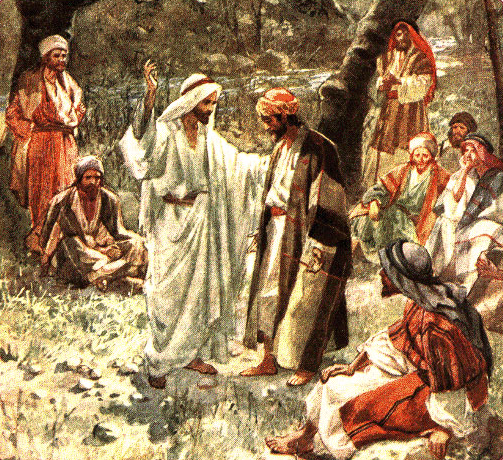
Editor’s note: The following comprises the fourth chapter, fourth part (D3), of The Gospel of Luke: An Exposition, by Charles R. Erdman (published 1936). All spelling in the original.
3. Jesus Predicting His Death (9:18-27)
___________________________________________________
18 And it came to pass, as He was praying apart, the disciples were with Him: and He asked them, saying, Who do the multitudes say that I am? 19 And they answering said, John the Baptist; but others say, Elijah; and others, that one of the old prophets is risen again. 20 And He said unto them, But who say ye that I am? And Peter answering said, The Christ of God. 21 But He charged them, and commanded them to tell this to no man; 22 saying, The Son of man must suffer many things, and be rejected of the elders and chief priests and scribes, and be killed, and the third day be raised up. 23 And He said unto all, If any man would come after me let him deny himself, and take up his cross daily, and follow me. 24 for whosoever would save his life shall lose it; but whosoever shall lose his life for my sake, the same shall save it. 25 For what is a man profited, if he gain the whole world, and lose or forfeit his own self? 26 For whosoever shall be ashamed of me and of my words, of him shall the Son of man be ashamed, when He cometh in His own glory, and the glory of the Father, and of the holy angels. 27 But I tell you of a truth, There are some of them that stand here, who shall in no wise taste of death, till they see the kingdom of God.
___________________________________________________
The first clear prediction of His death was made by Jesus directly after He had heard the famous confession of Peter. The latter was occasioned by a question Jesus himself had asked, “Who do the multitudes say that I am?” The answer is exactly that given by multitudes in modern days, “And they answering said, John the Baptist; but others say, Elijah; and others, that one of the old prophets is risen again;” that is to say, a reformer, a great preacher, a messenger of God. Such an estimate of Himself never satisfied our Lord and so He asked pointedly: “But who say ye that I am? And Peter answering said, The Christ of God.” This is the great affirmation concerning Christ which the world today needs to hear; but at that time Jesus earnestly commanded His disciples to “tell this to no man.” The message would then have been misunderstood and the disciples themselves needed first to learn the truth concerning the death and resurrection of Jesus. No man today is qualified to testify for Christ who does not know the meaning of His atoning death and “the power of His resurrection.”
Then Jesus told His disciples of the absolute necessity of His approaching sufferings and assured them that on the third day He would be raised up. This prediction of death must have astonished the disciples; quite as surprising was the further statement that every follower of Christ must likewise take up his cross daily, and the cross was not merely a symbol of suffering and shame; it was the instrument of death. Every Christian, therefore, must die daily to self and yield himself wholly to the service of Christ. Such self-denial and sacrifice and obedience will result in the only experience worthy of the name “life;” to refuse is to forfeit “life;” and the loss will be eternal for those who are ashamed to follow the Master now will be rejected by Him when he returns “in his own glory, and the glory of the Father, and of the holy angels.” Of this future glory of the coming Christ, three of the disciples were to catch a foregleam only eight days later on the Mount of Transfiguration, and Jesus therefore adds, “There are some of them that stand here, who shall in no wise taste of death, till they see the kingdom of God.”
(Go back to previous chapter)
(Continue to next chapter)









